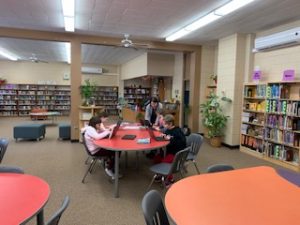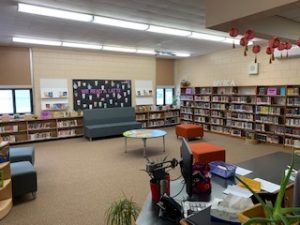For Theme 1 in course 467 63C, I found that all the readings and the topics presented in “Reference Skills for the School Librarian” and “Achieving Information Literacy” offered a lot of valuable information for teachers and teacher-librarians about reference resources and the importance of offering quality reference materials and services to teach information literacy. At the moment, I am a not currently working as a teacher-librarian but the Theme 1 topics have provided an incredible amount of useful information that has led me to reflect on my future role as a teacher-librarian, what my library has to offer and how I use it, and areas that I need to improve upon as a teacher.
 image by Pixabay
image by Pixabay
The Canadian Association for School Libraries document Achieving Information Literary offered a comprehensive breakdown of the standards of a school library. What was described as an acceptable amount of reference resources sounded reasonable. In my mind, I pictured my school library and I drew upon my knowledge of the collection based on what I had used in my teaching. I imagined that my school library would closely measure up to the standards listed in AIL. With the AIL standards in mind and a list of types of reference resources in hand, I decided to investigate and learn about what my school library had to offer. The experience allowed me to get a clearer picture of the reference resources that were available, which areas of the collection needed to be added or weeded, which types of reference materials were absent from the collection and which area needed the most attention. My school library reached acceptable standards in some areas. I was surprised to see the absence of certain types of reference materials, the currency of the collection and the lack of electronic/digital resources. This led me to think about my vision for my school library and what needs to be accomplished to make it a well-equipped learning space. With this in mind, I also considered the library budget. Riedling offers an extensive list of criteria for evaluating and selecting reference resources. When selecting resources for purchase I can now see the importance of making informed decisions about resources especially when every dollar counts. The American Library Association offers a list of characteristics that would help guide the TL in creating a great school library.
I’ve included a few pictures of my school library.


After reading Chapters 2-8 in “Reference Skills for the School Librarian”, and learning about selection and evaluation of the reference collection, I was excited about digging into my school library collection to find materials that needed to be replaced. I was driven with the new-found knowledge of the criteria to evaluate a reference resource and determined to find a suitable replacement. It was relatively easy to find something in my school library that needed to be replaced. What I didn’t realize was how difficult it would be to find new reference resources to replace what I had found. Searching for a replacement took an incredible amount of time. I was able to find some suitable reference resources through the websites provided by Reidling, but I was frustrated that I was unable to take a good look at the books. I had difficulty finding reviews for the books as well. Is this typical when searching for replacements?

Lastly, in learning about the reference and inquiry process, it has become clear to me that this is an area that I need to learn more about. I am interested in finding examples of lessons that would help to guide me through the process and help prepare the student for completing inquiry projects. Through my search, I found the following websites that can serve as a jumping-off point with my grade 4-5 class.
https://www.sciencelessonsthatrock.com/
https://www.teachthought.com/pedagogy/4-phases-inquiry-based-learning-guide-teachers/
https://www.wabisabilearning.com/blog/inquiry-based-learning-activities
https://online.kidsdiscover.com/10-ideas-for-excellent-inquiry-based-learning
https://www.madlylearning.com/inquiryprojects/
Asselin, Marlene, et al. Achieving Information Literacy: Standards for School Library Programs in Canada. Canadian Association for School Libraries Association, 2006.
Riedling, Ann Marlow, et al. “Reference and the School Library: An Overview.” Reference Skills for the School Library: Tools and Tips, 3rd ed., 2013.

I enjoyed reading your blog entry, Kathleen. Thanks for your honesty! I also found it challenging to find a replacement reference material. It seems like there should be a centralized source with current recommendations for various types of resources, right? I’m not in a T-L either right now, so perhaps if we were, we would be more connected with other T-Ls in our districts, which would be helpful in this type of a situation!
Hi Angela,
Thank you for your reply. I’m not sure if you experienced this but I also had a hard time finding reviews from reliable sources. I did manage to find reviews, but they were postings from people on Twitter. I don’t think that counts as a reliable source. The experience made me wonder if book publishers offer events that would allow T-L’s to look at the books they are interested in purchasing. Asking other T-L’s for advice about which books they have in their collection is a good way to go about making sure you’re purchasing good resources, spending some time at your local library, talking to suppliers and visiting the book store.
Hi, the BCTLA conference in Oct had vendors bring resources down, but from what I saw they were mostly fiction books and not really for the reference section; however, the representatives on hand were really knowlegeable and were able to provide contact information for us to follow up with after.
The newer version of Riedlings text also offers some review recommendation sites for reference texts:
– Booklist
– School Library Connection
– Library Journal
– School Library Journal
I tried searching them and found majority were subscription $$ based. I am curious if anyone has subscriptions to any of them and if they actually are useful. (Riedling, 2019, pg. 78)